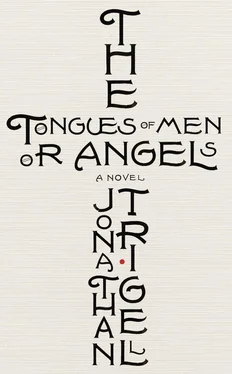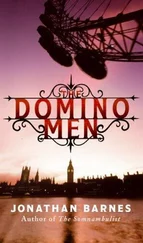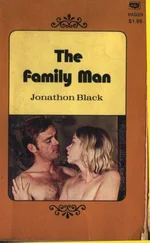Bishop Useful has already noticed that Paul is less vivid than once he was. And when described to other believers, the apostle must be abridged, when he was not an easily encapsulated man. It is simple to explain unwavering faith and unrelenting drive, but they were only part of Paul. In his letters you can still see glimpses of his contradictory complexity: quick in anger and filled with love; boastful and humble; convincing and irrational; tender and condemning. Without the reminder of those letters, Useful sometimes thinks that Paul’s humanity would disappear entirely. He might, like Jesus, become half-God.
During his youthful travels with Philemon, Useful passed through many an abandoned town. To look at them, you would think that the world was composed only of stone. When of course it isn’t: lives are largely formed of straw, plank, cloth, wicker, bone, baked clay and dried dung, but when all that has gone, when the rest has decomposed, what is left is stone. Stone tells lies, because it survives, and the frailer stories didn’t.
The End of the Age of Apostles

The first men of the Tenth Legion march up the ramp to the fortress of Masada at dawn. They arrive as a slot-eyed tortoise, a shield barricade against arrows. They come braced to battle desperation. A metalled centipede clambers through the breached wall, and enters a realm of terrible solitude.
Some surfaces are glazed with blood as butchers’ blocks; some rooms are filled with people; but nobody is home.
Rome has been chasing the wind.

And a scar-throated rock badger of a codger crawls from the tumbled wreckage of a portico at the Jerusalem Temple. The forecourt is in flame and ruin; soldiers in havoc hack and violate and loot.
And a Son of Thunder ought to do something. He ought to do what he should have done when they took Yeshua: he ought to charge the enemy and care not for the certainty of death. He should have done it when he was young and strong, when he still had his brother by his side and a king to fight for. But his king told him not to — nobody is perfect — so this will have to do. And he pulls a new knife from an old scabbard.
Bodies are piled in the mikveh baths. And human blood, Judaean blood, runs down the gutters of the altar. Roman boots soil the Holy of Holies. Legionaries tear the golden grapes from the gates, as they have ripped all the fruits from this land; and they smash the tiles of the cloisters, as if so many skulls; and they rend apart the tapestries like maidens’ skirts. And everywhere there is fire, so bright it stains the sky. And shrieks fill Jochanan’s ears. And smoke is in his teeth and his eyes.
And if this is not the apocalypse, it will suffice until one arrives.

And the Temple is whole again and James the Just is lying at the foot of the Kidron, amid thickets of bramble, dense as lamb’s wool. And though they are little more than lackeys of the aristocracy, it is still Jews who are gathering the stones — good Jerusalem stones, lime and pale. They are Temple Guards, they should be defenders of the faith, but they pelt him with rocks. And even then he lives on. So they finish him with fullers’ clubs. They swing down as if threshing corn. They have killed the Just One. And many will say that all the things which befell Judaea were revenge for this.

And in the centre of the sands of the Circus Flaminius, two men come at one another, sightless before the eyes of Rome. Each is armed with a honed gladius , and as they close the final steps to striking distance, each takes a swing of his weapon, feels the heft of it. Iron cuts the muggy air and the crowd begins to chant and cheer.
And then both men toss their swords away.
They hold one another, momentarily sharing strength. Two wrinkled old veterans, in helms with no eye-holes, embracing before the multitude. And doubtless cruel Charon will not tolerate it for long. And the mob must have its blood. But what use the tongues of men or angels if they don’t, in the end, speak of love?

And in Corinth people remember. People pray and people sing.

And in Galatia, someone reads aloud a letter.

And in Antioch, those pierced and painted and branded, with hair and hat and apparel of every folk and fashion of the Empire, share a single table, long as a grain-ship, in a building that was once a ruined warehouse, but which now has a new cedar roof and a big oak door, always open.

And in a market square in Hispania, Timothy wipes away with his palm the tear that threatens to form, and begins to speak.

And in Colossae, old Philemon clasps to him, and won’t let go of, the lumpen, useless bulk of that prodigal son, who isn’t.

And on a hot road towards Alexandria, John-Mark looks behind him at the two children who follow. They are not his offspring: he found them on the trail, somewhere between the desolation of Jerusalem and here. He would make better time and be safer without them and he isn’t over-fond of little children; but a man he loved once said he should suffer them, so he is. Their faces are tight-skinned with thirst. They have already walked far further than any child ever should. The smaller doesn’t look like she will last another mile. So John-Mark drops his refugee’s bundle and picks her up instead. To discover she’s less a burden than he feared. She brushes the dust from his grey dandelion hair, and John-Mark laughs.

And in Philippi, Lydia frees her slaves. Because, because, why should she not: so the axe is at the root of the tree, why can’t they meet it free? Surely, if today is the end time, then tomorrow something begins.

This Galilee basin is dry, but fertile; the chalky soil is flush with thickets of thistle and wild flowers. The donkey — draped with battered rags of saddle blanket — would doubtless like to stop and graze, but the man leading it doesn’t allow that. The man is not so old, but is already a little toil-crooked. Though covered with road dust, he is agreeably proportioned, in a creased kind of way.
His son walks beside him. The boy’s skin is smooth as settled butter, but dark as one who spends his days in the sun. He wears an oversized simlah that he is the third to own. Inherited from his grandfather and passed through a now deceased brother.
A breeze blows, only as strong as the breath the boy’s open mouth expels when he sleeps, but sufficient to lift the heat a little.
As the pair and their animal come to the edge of a village they would pass through, they find themselves at the tail of a strange procession: an angry-looking group of men are going somewhere; somewhere it looks like the lone woman in their midst — beautiful and pitiful — would rather not go. Several of the men are shepherds, dressed in the amateurishly tanned skins of fat-tailed sheep that died in ravine falls or from wolves or disease. They carry slings at their belts to drive off predators and hooked staffs in their hands. But most of the group look like peasant farmers; those with a parcel of land to their name can still just about keep a family from penury in this fruitful corner of the country.
Читать дальше















